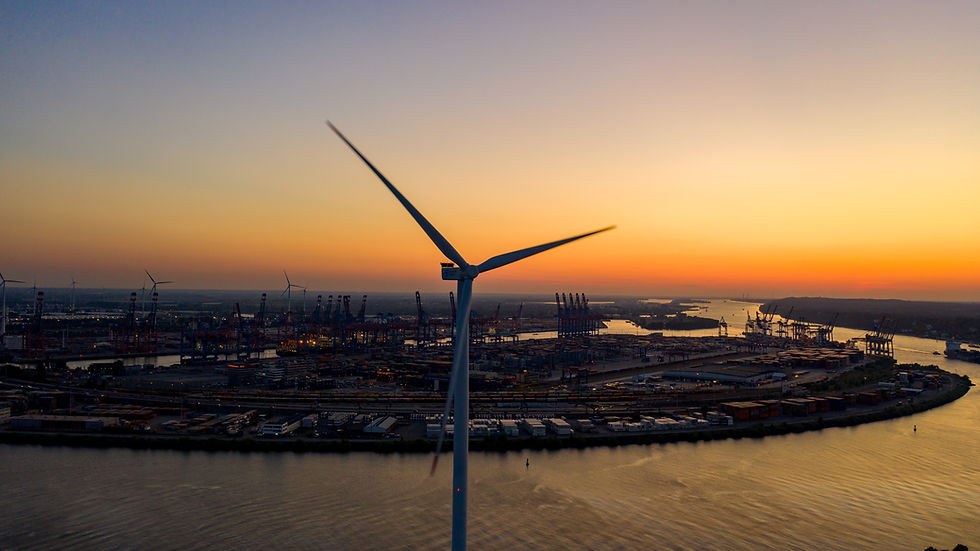ProTecBird enables successful protection of the red kite around wind turbines – Rheinmetall supplies expertise in the field of air defence for the detection of protected bird species
- Viola Heinzen

- Aug 23, 2024
- 4 min read

Bird detection by AVES Wind via species recognition AI (Artificial Intelligence) with indication of probability
© Photo Manfred Stöber; Montage ProTecBird
With AI and sensor technology from ProTecBird and software from the military sector, Rheinmetall and ProTecBird want to ensure the protection of red kites around wind turbines and at the same time contribute to the energy transition. Both companies have now announced the successful demonstration of the effectiveness of the AVES Wind anti-collision system for the protection of red kites around wind turbines, which was developed by ProTecBird by integrating Rheinmetall technology. With this milestone, the young technology start-up from Husum, which is specialised in the development and manufacturing of economical and species-specific anti-collision systems, has now overcome a significant hurdle for the energy revolution in Germany in partnership with Rheinmetall.
The development of effective anti-collision systems (ACS) has been one of the biggest challenges in the operation of wind farms in areas with wind-sensitive bird species. The balance between technical feasibility and reliable species protection is of central importance for the planning processes in the construction of wind farms. With its AI-based AVES Wind anti-collision system, ProTecBird has succeeded in solving this problem by defining and demonstrating the requirements for an anti-collision system in terms of nature conservation, economics and technology for the first time. By doing so, the system offers an alternative to generalised shutdown regulations by providing a customised solution for wind farm-operators through species- and situation-dependent short shutdowns.
As one of the federal states with the most wind power, Schleswig-Holstein is a pioneer in the establishment of forward-looking standards for anti-collision systems and their integration into approval procedures. On behalf of the Ministry of Energy Transition, Climate Protection, Environment and Nature of the Federal State of Schleswig-Holstein (MEKUN, Ger. for Ministerium für Energiewende, Klimaschutz, Umwelt und Natur), a committee was convened in September 2022 to develop a testing framework under the direction of the State Office for the Environment SH (LfU, Ger. for Landesamtes für Umwelt). This committee, consisting of a team of consultants (TÜV NORD, the Office for Biostatistics), ACS and wind energy manufacturers as well as stakeholders from nature conservation organisations and wind energy associations, developed a comprehensive testing framework for the validation of ACS by the end of 2023. On 8 August 2024, Tobias Goldschmidt, Minister of Energy Transition, Climate Protection, Environment and Nature of the Federal State of Schleswig-Holstein, announced the first nationwide testing framework for anti-collision systems. The testing framework is currently being evaluated by other Federal States in Germany in order to incorporate it into their own area of responsibility.
The AVES Wind system from ProTecBird was tested at an existing wind farm between July and September 2023 in accordance with the requirements of the technical convention proposal “Test framework for anti-collision systems” (MEKUN 2024). A total of 237 red kite flight sequences were analysed at various sites on a total of 25 recording days: AVES Wind detects, recognises and protects the red kite in accordance with the specifications of the technical convention proposal (MEKUN 2024), meaning that the species protection requirements and the protective effect for the red kite are fully met by the ProTecBird anti-collision system.
“We are delighted to have our AVES Wind anti-collision system recognised, and are proud to be making a contribution to the energy revolution,” comments Thorsten Heinzen, CEO of ProTecBird. “The cooperation with the relevant players in Schleswig-Holstein was crucial for this breakthrough. The fact that ProTecBird was the first company to undergo and pass the officially defined testing framework highlights the company’s innovative strength and commitment. With its AVES Wind anti-collision system, ProTecBird has achieved a technological breakthrough that can be seen as disruptive for the wind energy industry,” continues Thorsten Heinzen. “We have created a clever networked system that utilises the existing wind farm infrastructure and further improves the effectiveness and sustainability of the generated wind energy”.
The solution of the AI-based AVES Wind anti-collision system is based on software developed by Rheinmetall Electronics GmbH, which was originally programmed for air defence in the military sector and is in use worldwide.
Rheinmetall uses an established software (Multi Mode Tracker) that can recognise and assign missiles via pixel changes on the horizon. Thanks to the further development of the software by ProTecBird and the use of the newly developed AI, different bird species, such as the protected red kite, can now be reliably recognised and tracked by the systems’ sensors. As a result, automated shutdown commands are sent to wind turbines, effectively preventing collisions between the animals and the rotor blades from a predefined distance between the bird and the wind turbine.
“The possible applications go far beyond the original military field,” explains Uwe Lindenau, Sales Manager Mission Systems at Rheinmetall Electronics GmbH.
“The cooperation between Rheinmetall and ProTecBird is unique worldwide. With our software and the technical expertise of ProTecBird, not only can unique protected birds such as the red kite or the white-tailed sea eagle be protected. Concerning the aviation sector, it also offers great benefits for flight safety regarding bird strikes on aircraft engines and the airframe,” Lindenau continues.
For Rheinmetall, demonstrating the effectiveness of the system in wind turbines is a successful example of the Group’s involvement in environmental protection.
As a technology start-up, ProTecBird is determined to push ahead with its research and development. The company is currently working on expanding its technology to other animal species, such as real-time detection of bats, to ensure more comprehensive protection of wildlife.
In addition, ProTecBird aims to expand its partnerships to promote the use of renewable energy not only in Germany but also worldwide.



